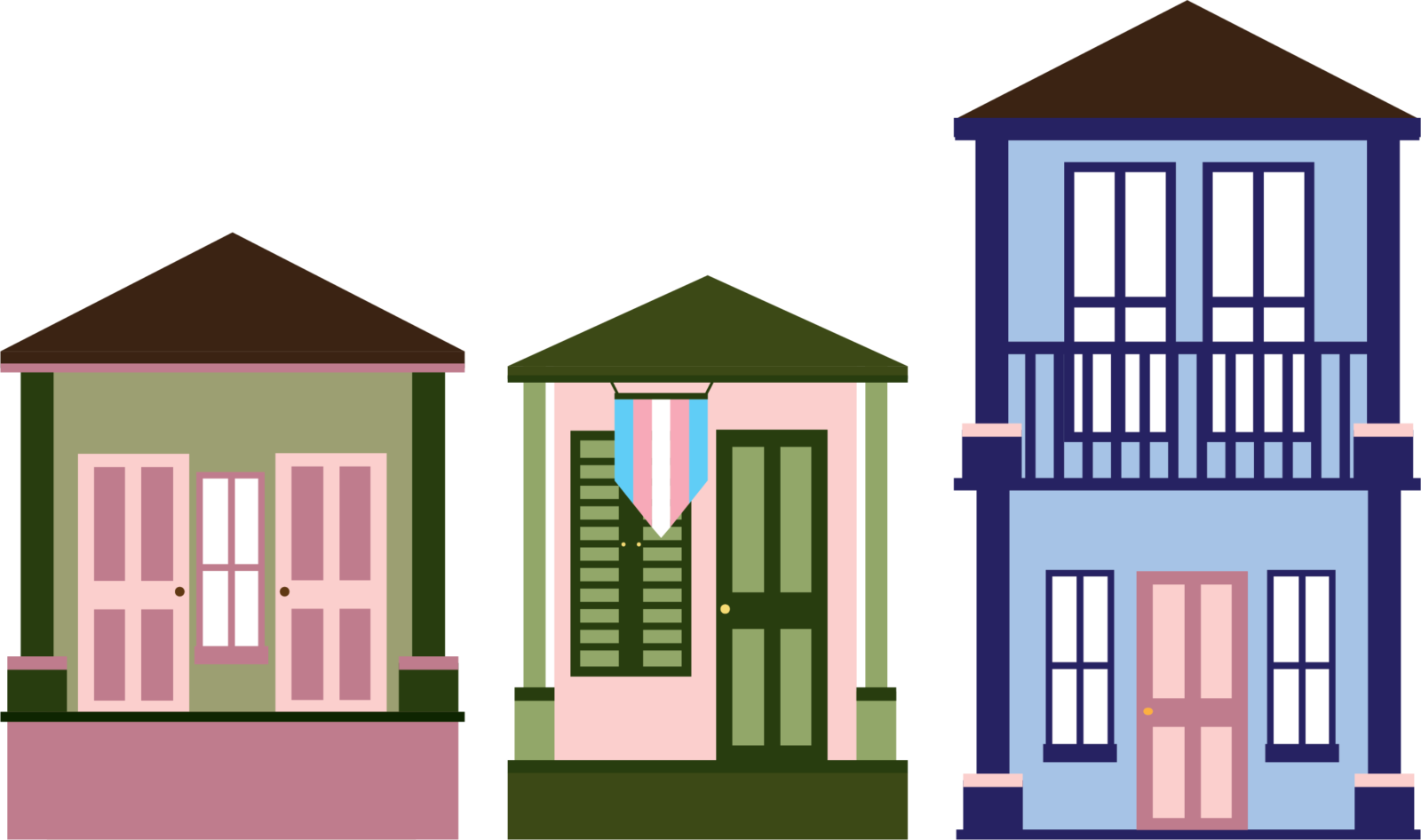Mapping Trans Joy
A community finds belonging and resists erasure
Published: November 30, 2023
Last Updated: February 29, 2024

Illustration by Erin Theriot
But joy in the transgender community shines through these dark days. This is evident in various projects that document the stories of transgender and gender non-conforming (TGNC) individuals. For example, the Louisiana Trans Oral History Project collected personal narratives from TGNC communities for more than three years; nearly every interviewee spoke about joy in their life and their work. Likewise, Last Call Oral History Project, based in New Orleans, has found the same emphasis on joy embedded in personal narratives in their work. The theme is so present that they have started a joy-focused project. Even the recent podcast Mais Jamais: The Story of Louisiana’s Anti-Trans Legislation and the Story of Our Resistance dedicated special coverage to account for the joy that regularly came up in interviews.
Take, for example, the following video message from a trans community member in Lake Charles, Louisiana:
My name is Micah. I’m a PLPC [provisional licensed professional counselor] in Lake Charles. For the record, Lake Charles is a very small town. Throughout most of my life, we have had one gay bar—the entrance of which was located behind a dumpster, behind a building, to give you a little bit of context.
So coming out of grad school and going into my very first job as a counselor, I was a little bit nervous and apprehensive about people using my pronouns and my preferred name. However, I couldn’t have asked for a more accepting group of people to work with.
Everyone calls me Mr. Micah, which gives me so much gender euphoria every time I hear it. Usually I would use “they” and “he” pronouns. [My colleagues] end up just using “he” pronouns. And because of that, I’ve come to realize that I actually prefer that.
So I’ve just felt so safe and so incredibly validated, but in such a mundane, everyday way. Which is how it should be. There isn’t any special attention being given to the fact that I’m trans and that I’m “Mr. Micah.” So I just come to work every day and experience moments of gender euphoria.
That’s my two cents from here in Lake Charles.
This snapshot of how joy manifests in Micah’s life is indicative of not only the power of storytelling but also the power of having a framework to notice these moments and to share them. It was recorded and shared through a project called Mapping Trans Joy.
Mapping Trans Joy is an opportunity to highlight, uplift, and celebrate this joy in the TGNC community. At its heart, Mapping Trans Joy is a collaborative mapping project that allows TGNC community members to share short personal narratives of the places in which they have felt accepted, supported, comforted, empowered, or otherwise at peace in their identity and community. Taken together, these narratives, made visible on mappingtransjoy.org, offer a powerful re-visioning of our geographies—as seen through a lens of trans joy. The project began in 2021 with a Rebirth Grant from the Louisiana Endowment for the Humanities that allowed us to compensate early participants and build the technical infrastructure of the website and workflows.
In spring 2023 we opened the project to submissions beyond Louisiana. At the time of this writing we have narratives from nine states as well as Canada, the United Kingdom, and Germany. The project is growing through word of mouth and social media outreach, as well as partnerships with organizations in different states. These partnerships support the project in multiple ways: they help promote Mapping Trans Joy to their local communities; they serve as a type of semi-formal advisory board as the project grows; and they help the core Mapping Trans Joy team consider locally specific safety concerns.
[We] need to share our joy, both among ourselves and with the larger population.
Safety is a central concern of the project. All participants are welcome to submit their narratives anonymously to protect their identity (currently, about 35 percent have chosen to do so). Furthermore, before narratives are added to the map, the Mapping Trans Joy team ensures that the location mapped is not the participant’s personal residence or place of business. The goal is to ensure that the map cannot be used to locate the participant. Locations for the map should be public, such as parks, or businesses open to everyone, such as restaurants.
Participants have the choice to submit a video, a sound recording, or a text to the map. Each submission is reviewed by a member of the Mapping Trans Joy team. In addition to safety concerns, the team reviews each submission for appropriateness for the project. In the cases that participants share their email address with the team, they also receive a note when their content is ready to be viewed on the map, and the Mapping Trans Joy team takes this opportunity to help grow the project by encouraging each participant to share the project with their communities.
Though most of the work of Mapping Trans Joy is done online, there is a strong physical and site-specific component as well. Over the course of 2022, the Mapping Trans Joy team hosted a number of “joy events,” in-person gatherings centered around sharing joy-related narratives and building community. In 2023 in Baton Rouge, Mapping Trans Joy held its first Trans Joy Fest, hosting over seventy individuals for a community-building event with activities such as zine and bracelet making, paper crane folding, flower arrangement, door prizes, and a drag variety show. More activities are planned for the years ahead as the project becomes an increasingly national and international project.
Often, narratives of pain, loss, and death dominate stories of the TGNC communities. These narratives are true and important to share. But we also need to share our joy, both among ourselves and with the larger population. Mapping Trans Joy is centering joy as a present, powerful, and sustaining force in our communities.
Visit the Louisiana Trans Oral History Project at louisianatransoralhistory.org, the Last Call Oral History Project at lastcallnola.org, and Mapping Trans Joy at mappingtransjoy.org.
Sophie Ziegler (they/them) is a librarian, archivist, oral historian, and educator based in Baton Rouge. They are a co-founder of Mapping Trans Joy, director of the Solidarity History Initiative, and lead organizer of Screaming into the Future, a zine library and studio space in Baton Rouge.
